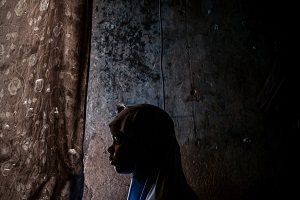Lake Chad conflict: alarming surge in number of children used in Boko Haram bomb attacks this year – UNICEF
The number of children used in ‘suicide’ attacks in the Lake Chad conflict has surged to 27 in the first quarter of 2017, compared to nine over the same period last year, UNICEF said in a new report released on Apr 11.

Dada, 15 years old, and her daughter, Hussaina, 2 years old, at home in a host community shelter in Maiduguri, Borno State, Nigeria on March 1, 2017.
“In the first three months of this year, the number of children used in bomb attacks is nearly the same as the whole of last year – this is the worst possible use of children in conflict,” says Marie-Pierre Poirier, UNICEF’s Regional Director for West and Central Africa.
The increase reflects an alarming tactic by the insurgents, according to the report Silent Shame: Bringing out the voices of children caught in the Lake Chad crisis. So far, 117 children have been used to carry out bomb attacks in public places across Nigeria, Chad, Niger and Cameroon since 2014: four in 2014, 56 in 2015, 30 in 2016 and 27 only in the first three months of 2017. Girls have been used in the vast majority of these attacks.
As a consequence, girls, boys and even infants have been viewed with increasing fear at markets and checkpoints, where they are thought to carry explosives.
“These children are victims, not perpetrators,” says Poirier. “Forcing or deceiving them into committing such horrific acts is reprehensible.”
Released three years after the abduction of over 200 schoolgirls in Chibok, the report provides troubling accounts by children who were held in captivity at the hands of Boko Haram, and shows how these children are met with deep suspicion when they return to their communities.
In interviews, many children who have been associated with Boko Haram report that they keep their experience secret because they fear the stigmatization and even violent reprisals from their community. Some are compelled to bear their horrors in silence as they remove themselves from other groups for fear they might be outed and stigmatized.
The report also highlights the challenges that local authorities face with children who have been intercepted at checkpoints and taken into administrative custody for questioning and screening, raising concerns about the prolonged periods of custody.
In 2016, almost 1,500 children were under administrative custody in the four countries. The release of more than 200 children by Nigerian authorities on the 10th of April is a positive step towards the protection of children affected by the ongoing crisis.
UNICEF calls on parties to the conflict to commit to the following actions to protect children in the region:
◾End grave violations against children by Boko Haram including the recruitment and use of children in armed conflict as so-called ‘suicide bombers’.
◾Move children from a military to civilian environment as quickly as possible. Children who have been taken into custody solely for their alleged or actual association to armed groups should be immediately handed-over to civilian authorities for reintegration and support. Handover protocols should be in place in each of the four countries for children encountered during military operations.
◾Provide care and protection for separated and unaccompanied children. All children affected by the crisis need psychosocial support and safe spaces to recover.
In 2016, UNICEF reached over 312,000 children with psychosocial support in Nigeria, Chad, Cameroon and Niger, and reunited more than 800 children with their families.
UNICEF is working with communities and families to fight stigma against survivors of sexual violence and to build a protective environment for former abductees.
In a crisis that has displaced more than 1.3 million children, UNICEF also supports local authorities to provide safe water and life-saving health services; restore access to education by creating temporary learning spaces; and deliver therapeutic treatment to malnourished children.
The response to this crisis remains severely underfunded. Last year, UNICEF’s US$154 million appeal for the Lake Chad Basin was only 40 per cent funded.
Source:United Nations Children's Fund
- 271 reads
Human Rights
Ringing FOWPAL’s Peace Bell for the World:Nobel Peace Prize Laureates’ Visions and Actions

Protecting the World’s Cultural Diversity for a Sustainable Future

The Peace Bell Resonates at the 27th Eurasian Economic Summit

Declaration of World Day of the Power of Hope Endorsed by People in 158 Nations

Puppet Show I International Friendship Day 2020

